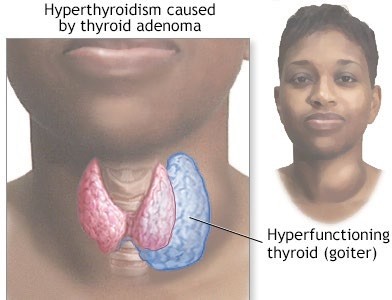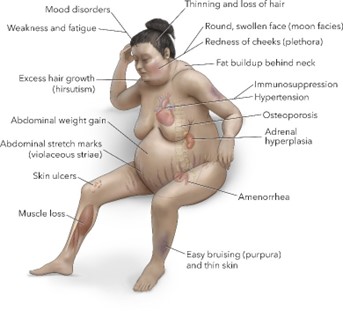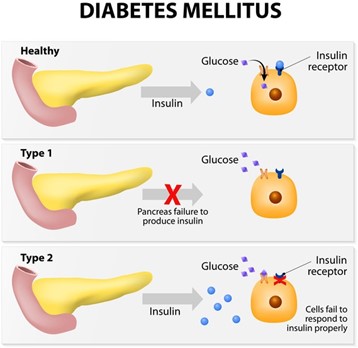A 40-year-old female client has a family history of "thyroid problems" and is being seen by the primary healthcare provider for unintentional weight loss, irritability, and chest discomfort. Her probable diagnosis is hyperthyroidism, which the primary healthcare provider plans to confirm by laboratory testing.
What additional physical assessment findings would the nurse expect to be present in this client?
Select all that apply.
Diaphoresis
Insomnia
Hypotension
Decreased deep tendon reflexes.
Constipation
Correct Answer : A,B,E
Answer c is incorrect because hyperthyroidism typically causes hypertension, not hypotension. Answer d is also incorrect because hyperthyroidism typically causes increased, not decreased, deep tendon reflexes. Answer f is incorrect because hyperthyroidism typically causes diarrhea, not constipation.

Nursing Test Bank
Naxlex Comprehensive Predictor Exams
Related Questions
Correct Answer is D
Explanation
Cushing syndrome is caused by excessive cortisol production by the adrenal glands, which can result in weight gain and redistribution of fat to the abdomen, giving it a characteristic rounded appearance.
The other options mentioned in the question are not typically associated with Cushing syndrome. Chronically low blood pressure is not typically seen in Cushing syndrome, as cortisol is a hormone that can raise blood pressure. A bronzed appearance of the skin is more commonly seen in conditions like Addison's disease, where there is a deficiency of cortisol. Decreased axillary and pubic hair is not a common finding in Cushing syndrome, although excessive hair growth (hirsutism) may occur due to the excess of androgens produced by the adrenal glands.

Correct Answer is ["A","D","E"]
Explanation
Option A indicates that the client understands the timing of glyburide administration, which is typically taken with the first bite of a meal to aid in glucose control.
Option d indicates that the client understands the importance of continuing antidiabetic medications even when they are sick. Skipping doses during illness can lead to uncontrolled blood glucose levels.
Option e indicates that the client understands the importance of foot care in preventing complications related to peripheral neuropathy, such as diabetic foot ulcers.
Option b is incorrect because patients with peripheral neuropathy should not walk barefoot, as they may not feel injuries to their feet, which can lead to diabetic foot ulcers and other complications.
Option c is incorrect because antidiabetic medications do not allow patients to eat whatever they desire. Patients with diabetes need to follow a healthy diet and exercise plan to manage their blood glucose levels effectively.

Whether you are a student looking to ace your exams or a practicing nurse seeking to enhance your expertise , our nursing education contents will empower you with the confidence and competence to make a difference in the lives of patients and become a respected leader in the healthcare field.
Visit Naxlex, invest in your future and unlock endless possibilities with our unparalleled nursing education contents today
Report Wrong Answer on the Current Question
Do you disagree with the answer? If yes, what is your expected answer? Explain.
Kindly be descriptive with the issue you are facing.
